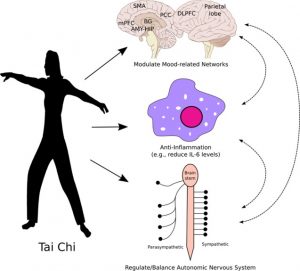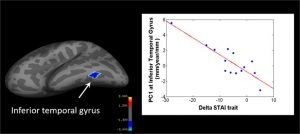Therapeutic Alliance is Important for Success in Treating Cancer Patients with Mindfulness
By John M. de Castro, Ph.D.
“Compared with [treatment as usual], MBCT and eMBCT were similarly effective in reducing psychological distress in a sample of distressed heterogeneous patients with cancer.” – Felix Compen
Receiving a diagnosis of cancer has a huge impact on most people. Coping with the emotions and stress of a cancer diagnosis is a challenge and there are no simple treatments for these psychological sequelae of cancer diagnosis. But cancer diagnosis is not necessarily a death sentence. Over half of the people diagnosed with cancer are still alive 10 years later and this number is rapidly increasing. It is estimated that 15 million adults and children with a history of cancer are alive in the United States today. But, surviving cancer carries with it a number of problems. “Physical, emotional, and financial hardships often persist for years after diagnosis and treatment. Cancer survivors are also at greater risk for developing second cancers and other health conditions.” National Cancer Survivors Day.
Mindfulness training has been shown to help with cancer recovery and help to alleviate many of the residual physical and psychological symptoms, including stress, sleep disturbance, and anxiety and depression. Mindfulness-Based Cognitive Therapy (MBCT) consists of mindfulness training and Cognitive Behavioral Therapy (CBT). During therapy the patient is trained to investigate and alter aberrant thought patterns underlying their reactions to cancer. So, it would make sense to study the effectiveness of MBCT and the characteristics of the therapy the psychological distress of cancer patients.
In today’s Research News article “Therapeutic alliance-not therapist competence or group cohesion-contributes to reduction of psychological distress in group-based mindfulness-based cognitive therapy for cancer patients.” (See summary below or view the full text of the study at: https://www.ncbi.nlm.nih.gov/pmc/articles/PMC6680267/ ), Bisseling and colleagues recruited cancer patients who were high in anxiety and depression and randomly assigned them to receive Mindfulness-Based Cognitive Therapy (MBCT) delivered either face-to-face in groups or online or to continue receiving treatment as usual. MBCT was delivered in 8 weekly 2.5 hour sessions along with audio guided home practice. They were measured before and after treatment for psychological distress, group cohesion, therapeutic alliance, and therapist competence.
Only the data from patients who had completed therapy were included in the analysis. They found that following treatment there was a significant decrease in anxiety and depression (psychological distress). They also found that the higher the levels of therapeutic alliance the greater the reduction in psychological distress. This was not true for either the group cohesion or the therapist competence.
Therapeutic alliance consists of “how closely client and therapist agree on and are mutually engaged in the goals of treatment; how closely client and therapist agree on how to reach the treatment goals; and the degree of mutual trust, acceptance, and confidence between client and therapist.” So, the results suggest that this relationship between patient and therapist is an important factor in the effectiveness of mindfulness treatment to improve the psychological distress of cancer patients. It is not how good the therapist is, but how well they create a mutual agreement regarding the therapy that is important for the effectiveness of the therapy.
This agreement may signal a buy-in by the patient to the efficacy of the therapy. This, in turn, can drive a positive expectation for therapeutic success both from the patient and the therapist. It has been demonstrated that the beliefs of the patient and the therapist have powerful effects on the outcome. So, it is possible that the therapeutic alliance is simply a measure of the power of those expectations and, in turn, the effectiveness of the program.
“Mindfulness-based cognitive therapy (MBCT) and individual Internet-based MBCT (eMBCT) had comparable efficacy in improving psychological distress among patients with cancer.” – James Nam
CMCS – Center for Mindfulness and Contemplative Studies
This and other Contemplative Studies posts are also available on Google+ https://plus.google.com/106784388191201299496/posts and on Twitter @MindfulResearch
Study Summary
Bisseling, E. M., Schellekens, M., Spinhoven, P., Compen, F. R., Speckens, A., & van der Lee, M. L. (2019). Therapeutic alliance-not therapist competence or group cohesion-contributes to reduction of psychological distress in group-based mindfulness-based cognitive therapy for cancer patients. Clinical psychology & psychotherapy, 26(3), 309–318. doi:10.1002/cpp.2352
Abstract
Mindfulness‐based cognitive therapy (MBCT) is an innovative evidence‐based intervention in mental and somatic health care. Gaining knowledge of therapeutic factors associated with treatment outcome can improve MBCT. This study focused on predictors of treatment outcome of MBCT for cancer patients and examined whether group cohesion, therapeutic alliance, and therapist competence predicted reduction of psychological distress after MBCT for cancer patients. Moreover, it was examined whether therapist competence facilitated therapeutic alliance or group cohesion. Multilevel analyses were conducted on a subsample of patients collected in a larger randomized controlled trial on individual internet‐based versus group‐based MBCT versus treatment as usual in distressed cancer patients. The current analyses included the 84 patients who completed group‐based MBCT out of 120 patients who were randomized to group‐based MBCT. Group cohesion and therapist competence did not predict reduction in psychological distress, whereas therapeutic alliance did. In addition, therapist competence did not predict therapeutic alliance but was associated with reduced group cohesion. Our findings revealed that therapeutic alliance significantly contributed to reduction of psychological distress in MBCT for cancer patients. Elaborating the clinical implications of the predictive significance of therapeutic alliance might be of added value to enhance the potential effect of MBCT.
Key Practitioner Message
- Mindfulness‐based cognitive therapy (MBCT) is an innovative evidence‐based intervention in mental and somatic health care and has been increasingly applied in oncology to reduce psychological distress.
- Therapeutic alliance predicts reduction in psychological distress after MBCT for cancer patients, whereas group cohesion and therapist competence did not.
- Therapist competence did not appear to be a precondition for a good therapeutic alliance and high group cohesion.
- Contrary to expectation, we found competence to be negatively related to group cohesion.
- Elaborating the clinical implications of the predictive significance of therapeutic alliance might be of added value to enhance the potential effect of MBCT for cancer patients.
- The current findings should be taken into account in the training of MBCT therapists.
https://www.ncbi.nlm.nih.gov/pmc/articles/PMC6680267/









